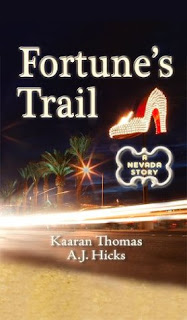Fortune's Trail
I'm endlessly fascinated with Las Vegas, and will read anything about it. So I picked up Fortune's Trail, by Kaaran Thomas and A.J. Hicks, subtitled A Nevada Story. Here is an example of a book that is well researched but the prose is pedestrian, the dialogue simplistic, and it's a tedious read.
The story concerns Harriet, who grew up on a farm in Mississippi. She gets a job in the poker tent at a carnival (the local law enforcement is paid off to look the other way) and falls in love with the man running it, Sam Wilson. They marry and have a child, but the carnival business requires them to be always on the move, so they follow Sam's mentor, Bingo Baxter, to the burgeoning gambling Mecca of Las Vegas.
"The meadows that had once given sustenance to Indians and pioneers attracted gangsters and grifters, outcasts and misfits. They came from all over America, dreaming big dreams, running from the law, looking to make a fast buck on a street whose name conjured images of glamour and vice all over the world," goes an early passage, one of the more literary in the book. The authors get the facts right, how initially the action was downtown, and then spread to what became known as The Strip.
Sam works for Baxter at the Horseshoe (Baxter is clearly modeled on Benny Binion, as the Horseshoe was a real place, and the million dollars on cash on display was also real) but Harriet dreams bigger, wanting to build their own casino, which she does, The Silver Slipper. Sam dies of cancer, so she is on her own, a woman in a man's world. There is much discussion of getting loans and renting out her parking garage--not thrilling stuff.
The action runs from the '40s to 1964, and there is a sequel I'm not interested in reading. The authors may as well have written a nonfiction book about the early days of Vegas and dispensed with the dull story.
There are a few real people in the story, such as mobbed-up casino owner Moe Dalitz, who wants to buy Harriet's casino in the worst way, and Howard Hughes, who bought several casinos in the '60s and essentially drove the mob out of Vegas. This stuff is somewhat interesting to the fan of Vegas history, but it's wrapped in such a weak narrative that I suggest finding nonfiction to learn about it.
The story concerns Harriet, who grew up on a farm in Mississippi. She gets a job in the poker tent at a carnival (the local law enforcement is paid off to look the other way) and falls in love with the man running it, Sam Wilson. They marry and have a child, but the carnival business requires them to be always on the move, so they follow Sam's mentor, Bingo Baxter, to the burgeoning gambling Mecca of Las Vegas.
"The meadows that had once given sustenance to Indians and pioneers attracted gangsters and grifters, outcasts and misfits. They came from all over America, dreaming big dreams, running from the law, looking to make a fast buck on a street whose name conjured images of glamour and vice all over the world," goes an early passage, one of the more literary in the book. The authors get the facts right, how initially the action was downtown, and then spread to what became known as The Strip.
Sam works for Baxter at the Horseshoe (Baxter is clearly modeled on Benny Binion, as the Horseshoe was a real place, and the million dollars on cash on display was also real) but Harriet dreams bigger, wanting to build their own casino, which she does, The Silver Slipper. Sam dies of cancer, so she is on her own, a woman in a man's world. There is much discussion of getting loans and renting out her parking garage--not thrilling stuff.
The action runs from the '40s to 1964, and there is a sequel I'm not interested in reading. The authors may as well have written a nonfiction book about the early days of Vegas and dispensed with the dull story.
There are a few real people in the story, such as mobbed-up casino owner Moe Dalitz, who wants to buy Harriet's casino in the worst way, and Howard Hughes, who bought several casinos in the '60s and essentially drove the mob out of Vegas. This stuff is somewhat interesting to the fan of Vegas history, but it's wrapped in such a weak narrative that I suggest finding nonfiction to learn about it.



Comments
Post a Comment